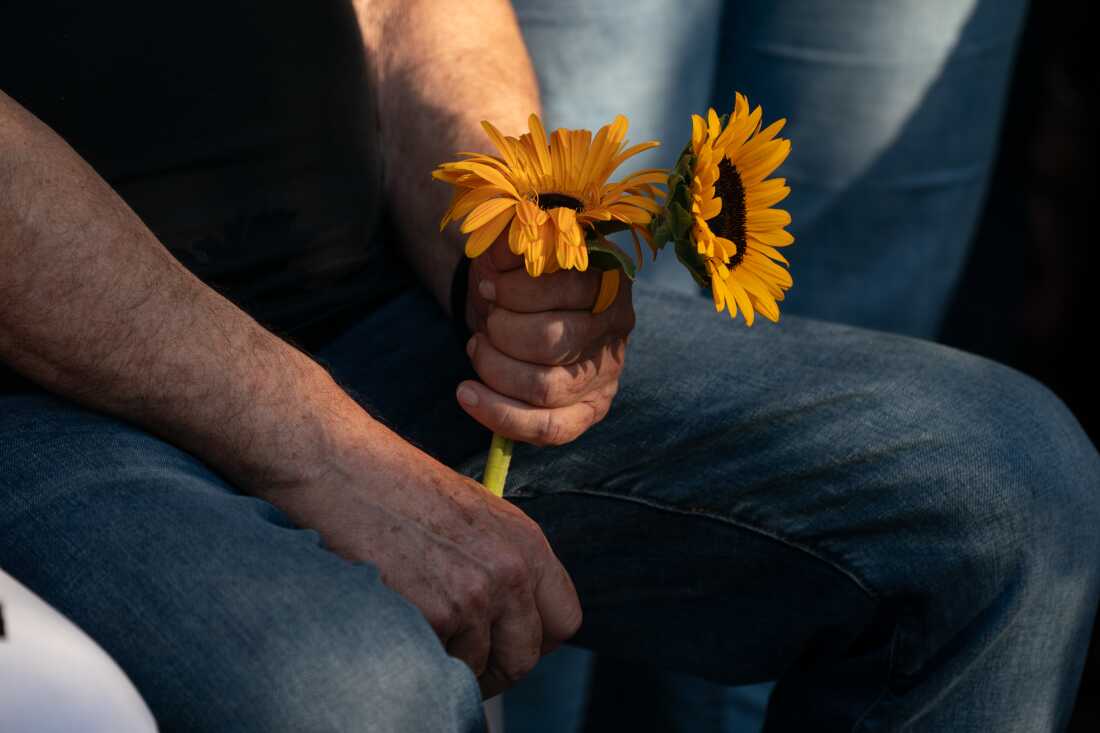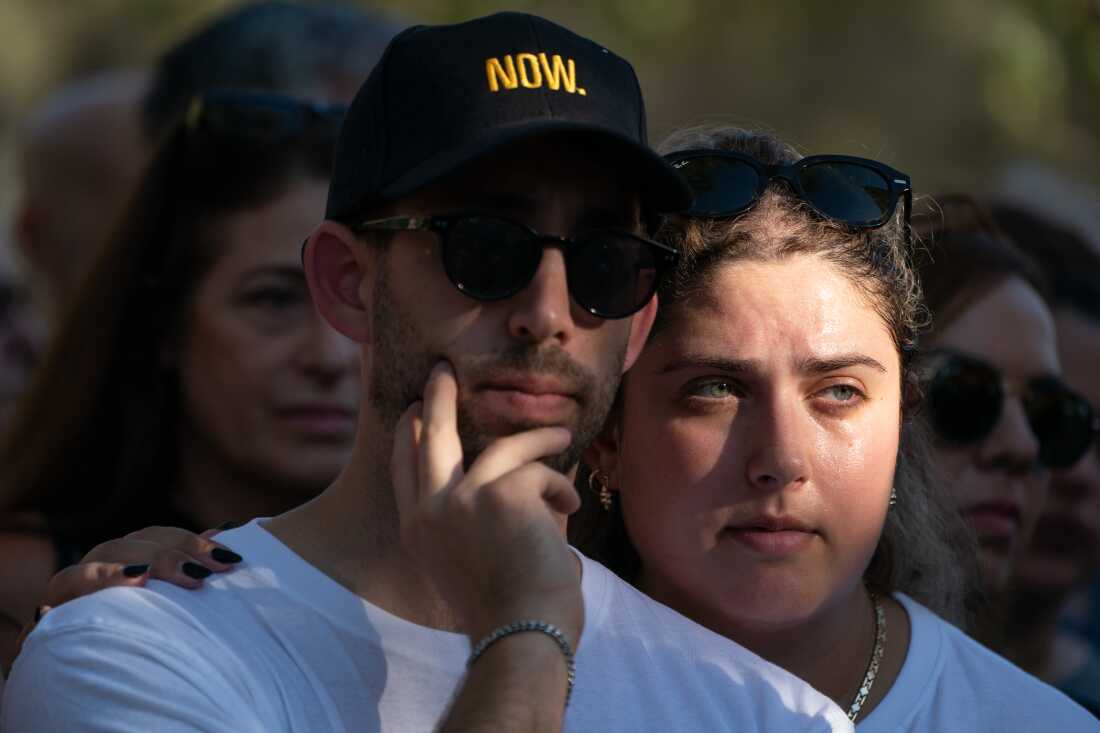
Members of the family attend the funeral of Abraham Munder, 79, in Nir Oz, Israel, on Aug. 22. He was taken hostage from Israel in a Hamas-led assault final Oct. 7 and his physique was one in all six recovered by Israeli forces from Gaza this week.
Maya Levin for NPR
disguise caption
toggle caption
Maya Levin for NPR
KIBBUTZ NIRIM, Israel — Ruth Nevo sits within the shade of a tree, amongst rows of white plastic garden chairs. She gently holds a pale pink flower. The chairs all face a contemporary grave, dug into the dry, dusty earth.
This kibbutz in southern Israel is lower than two miles from Gaza — the growth of explosions from the continued struggle there could be heard right here. It’s one of many communities devastated within the Hamas-led assault final Oct. 7, which Israel says killed round 1,200 individuals. One other 250 had been taken to Gaza as hostages.
The grave is for a type of hostages, 35-year-old Yagev Buchshtab, a sound technician who had a deep ardour for music and his 10 pets. His spouse, Rimon Buchshtab-Kirsht, was additionally taken hostage, however was launched after 50 days.
Yagev Buchshtab’s physique was one in all six recovered from Gaza by Israeli forces earlier this week.
“He was a very nice person, very unique,” Nevo remembers. She knew him since he was a baby; he was the primary grandson of her finest pal. She says having his physique again house is bittersweet.
“It’s a kind of closure. But the idea that he could be back alive — it’s really upsetting,” she says. “There was a possibility before and our government didn’t use it.”
It is a widespread and rising sentiment amongst most of the family and friends members of hostages, and Israelis typically: anger that after practically 11 months of struggle, Israeli Prime Minister Benjamin Netanyahu and his authorities haven’t finished sufficient to get the hostages dwelling alive.

Mourners attend the funeral of Abraham Munder on Aug. 22. Munder was taken hostage from his dwelling in Nir Oz alongside together with his spouse Ruti, daughter Keren and 9-year-old grandson Ohad final Oct. 7. His son Roy was killed that day and was reburied alongside his father in the identical service.
Maya Levin for NPR
disguise caption
toggle caption
Maya Levin for NPR
The restoration of the our bodies of Buchshtab and the opposite 5 hostages was introduced simply hours after Secretary of State Antony Blinken met with Netanyahu in Israel on Monday, attempting to push ahead a cease-fire that may finish the struggle in Gaza and permit for the discharge of the remaining Israeli hostages. That struggle has killed greater than 40,000 Palestinians, based on Gaza well being officers.
The Israeli army says 109 hostages nonetheless stay in Gaza and believes no less than 34 are lifeless. U.S. officers estimate about half of the remaining hostages are lifeless. Many hostage kin and their supporters consider that point is working out to get again those that stay alive and cease-fire talks set to renew in Cairo within the coming days is perhaps the final probability to make it occur.
A whole bunch of mourners file into the cemetery, greeted by Buchshtab’s household, together with his 28-year-old brother Yuval Buchshtab. He says since his brother was kidnapped, his complete life grew to become dedicated to getting him again. He attends protests all around the nation.
Yuval Buchshtab additionally believes that if a cease-fire deal had been signed months in the past, his older brother would nonetheless be alive.

A mourner holds flowers throughout Munder’s funeral, Aug. 22.
Maya Levin for NPR
disguise caption
toggle caption
Maya Levin for NPR
“This could have ended differently if things had happened differently,” Buchshtab says.
He says Israeli intelligence officers shared info together with his household that Yagev was alive for a number of months after being taken captive. Officers informed the household they assume he died just a few months in the past.
Buchshtab says even together with his brother’s physique again dwelling, he gained’t cease combating for the opposite hostages.
“It is possible that the waste of time during these days will determine the fate of more hostages and more families will end up in the situation we are in,” he warns.
Yagev’s casket is wheeled out, draped with the Israeli flag. It’s lowered into the bottom. His spouse kneels to the touch the casket — a closing goodbye. After which males seize shovels, and begin filling the opening with dust.
Some hostages have gotten out of Gaza alive. The most important quantity was again in November, when a short cease-fire deal allowed for 105 hostages, practically half of all these held, to be launched in trade for 240 Palestinian prisoners and detainees held by Israel.

Mourners attend the funeral of Abraham Munder, 79, in Nir Oz, Israel.
Maya Levin for NPR
disguise caption
toggle caption
Maya Levin for NPR
These watching this week’s Democratic Nationwide Conference had been reminded in regards to the hostages in Gaza when the mother and father of 23-year-old Hersh Goldberg-Polin took center-stage in Chicago to plead for a cease-fire that would come with the return dwelling of hostages together with their son. “There is a surplus of agony on all sides of the tragic conflict in the Middle East. In a competition of pain, there are no winners,” stated Jon Polin, sporting a bit of tape on his shirt with the quantity 320, indicating the times his son has been held captive by Hamas.
A brand new cease-fire deal is on the desk — one that may launch all of the remaining hostages — based mostly on a three-phase proposal that President Biden laid out in a nationwide tackle on Might 31. However within the greater than 11 weeks since then, a number of rounds of talks have ended at an deadlock. Israel and Hamas stay far aside on points like whether or not this cease-fire would imply a everlasting finish to the struggle, and if Israel can maintain forces alongside the border between Egypt and Gaza.
Worldwide mediators, together with a group from the USA, will decide up talks in Cairo this weekend, as they attempt to push Hamas and Israel nearer to reaching a deal.

Itay Raviv, whose grandfather was Munder’s brother, attends Munder’s funeral in Nir Oz, Israel, on Aug. 22. Raviv had been advocating for the discharge of his relations.
Maya Levin for NPR
disguise caption
toggle caption
Maya Levin for NPR
Simply down the street from Yagev Buchshtab’s funeral, one other of the six hostages recovered this week, 79-year-old Abraham Munder, can be being laid to relaxation. His funeral is in Kibbutz Nir Oz, one other group shattered within the Oct. 7 assaults.
Munder’s son was killed that day. His spouse, daughter and grandson had been taken hostage. They had been launched in November.
“We had hoped that Abraham would be released as well, but unfortunately he wasn’t,” says Itay Raviv, whose grandfather was Munder’s brother.
Raviv is sporting a shirt with Munder’s image on it, shirts the household had made to put on to protests and conferences with authorities officers. Raviv has been vocal in each Israel and the U.S., assembly with lawmakers wherever he might in an effort to get Munder out of Gaza.

A boy sits beside a wreath that reads “Kibbutz Nir Oz” on the funeral.
Maya Levin for NPR
disguise caption
toggle caption
Maya Levin for NPR
“We kept telling them there’s no time,” he says, “and it proved to be correct.”
When requested who he blames for his great-uncle’s dying in Gaza, he says, “Everyone.”
“First of all, of course, the main people to blame are Hamas. They’re terrorists. They’re my enemy. But of course, my government and the military, they’re the ones who were supposed to protect us, and they failed to do that one time after another,” Raviv says.
The service begins. It’s stuffed with music, Munder’s favourite Israeli songs, as a result of he liked to sing. His widow Ruti Munder speaks. After which his sister, Shoshi Ben Ezra, takes the microphone.
“Farewell to my brother,” she begins. “I’m sorry the country you loved so much took 10 months to bring you home.”
After which they decrease Abraham Munder into the bottom.
Shir David contributed to this report in southern Israel.





